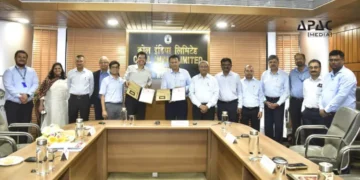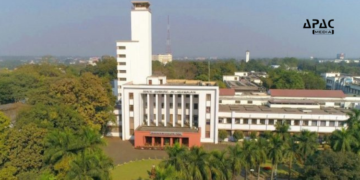New Delhi: Renesas India, a Japanese semiconductor and electronics manufacturer, will become the first company to design 3-nanometer (nm) chips end-to-end in India.
This announcement was made by Union Minister for Electronics and Information Technology, Ashwini Vaishnaw, on 13 May during the inauguration of the company’s new Noida Research and Development office.
Vaishnaw highlighted the importance of the milestone, stating, “So far, we have seen designs in 7 nm and 5 nm. This is the first time we will be entering the 3 nm technology. We are not just growing the electronics manufacturing industry at a double-digit compound annual growth rate (CAGR), but also developing a self-reliant semiconductor industry in India.”
In a first, 3nm chips will be designed in India. pic.twitter.com/jnqQZBQ1Zo
— Ashwini Vaishnaw (@AshwiniVaishnaw) May 13, 2025
The inauguration was complemented by a virtual launch of Renesas India’s Bengaluru design centre, reinforcing the company’s expanding presence in India’s rapidly growing semiconductor and electronics sectors.
In addition to the infrastructure developments, Renesas India has also made strides in strengthening India’s educational ecosystem.
On 13 May, the company signed a memorandum of understanding (MoU) with the Ministry of Electronics and Information Technology. As part of this collaboration, Renesas will provide 270 Indian colleges and universities with microcontroller-based hardware kits that can be used by students and faculty to develop new products, fostering innovation in the country’s tech landscape.
Renesas India is also pushing forward in the semiconductor assembly and testing domain.
In 2024, the company entered into a joint venture with Murgugappa Group’s CG Power and Thailand’s Stars Microelectronics to set up a semiconductor outsourced assembly and testing (OSAT) unit in Sanand, Gujarat.
The joint venture, with CG Power as the majority shareholder at 92.3 per cent, plans to invest over Rs 7,600 crore over the next five years. This new facility will have a total capacity of up to 15 million chips being packaged per day, contributing significantly to India’s semiconductor manufacturing capabilities.































































Discussion about this post